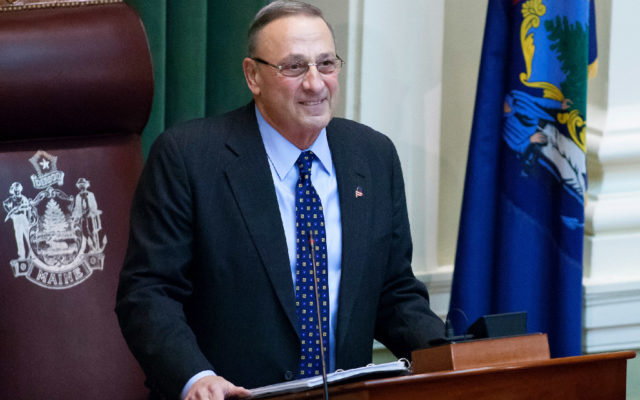
Paul LePage sells small-government COVID-19 response as Maine cases rage
By Jessica Piper, Bangor Daily News Staff
LEWISTON — Former Gov. Paul LePage is putting opposition to Gov. Janet Mills’ COVID-19 vaccine mandate for health care workers at the center of a laissez-faire pandemic agenda, notably saying states should not have worried much about spread among children.
Maine has set new records for new COVID-19 cases and hospitalizations in recent weeks, with the virus showing no sign of stopping heading into the holidays. The situation has led to testing challenges and taxed the health care system, while other New England states that similarly maintained lower infection rates in the early pandemic are seeing surges.
With little appetite across the political spectrum for the return of mask mandates or other mitigation measures that marked 2020, the political fight has been around a health care worker vaccine mandate. Vaccination rates increased dramatically after the mandate was announced in August. A small share of workers also quit, drawing ire from Republicans including LePage, who is running to oust the Democratic governor in the 2022 election.
Speaking at a Lewiston homeless shelter where he was encouraging donations in his first advertised campaign stop since a September kickoff speech, LePage said Friday he would get rid of the mandate for health care workers on “day one” if elected. He spoke strongly in favor of individuals choosing to get vaccinated, but shied away from state mitigation strategies in favor of a public relations approach and allowing less vulnerable children to contract the virus.
“What you should do is let them all have it, get that natural immunity and that’s when you’re going to achieve herd immunity,” LePage said.
It marks the latest iteration of partisan divide over COVID-19 mitigation measures. Republicans were critical of Mills’ capacity limits, travel restrictions and mask mandates, which she lifted after vaccines became widely available to adults. The state has among the highest vaccination rates in the U.S., with 83 percent of Mainers having received at least one dose.
As infections have surged late this year — particularly among unvaccinated people — Mills has encouraged Mainers to wear masks and take other precautions, but she has stopped short of new requirements. That leaves fewer disagreements with conservatives who are now focused on the vaccine mandate. The policy was supported by the Maine Hospital Association, although some facilities requested a testing alternative this fall that Mills flatly rejected.
Maine’s health care worker shortage predates COVID-19, although the pandemic has exacerbated it. Industry leaders have cited virus-related burnout as the primary factor causing workers to leave the field, with the mandate affecting fewer workers, though it challenged some nursing homes. Mills called up members of Maine National Guard last week to help staff beleaguered providers and requested federal assistance for Portland and Lewiston hospitals.
LePage has long said he would not have implemented some of the strict measures Mills did to prevent the virus in 2020, questioning the need for preventative measures aimed at children in particular due to low hospitalization rates. But while Maine has recorded only 60 hospitalizations and two deaths out of more than 30,000 cases among people younger than 20, epidemiologists have raised concern that children still spread the virus to vulnerable relatives. Cases among children have been a large part of Maine’s recent COVID-19 surge.
The former governor, who is quick to note he is vaccinated and has received a booster shot, said he would have favored an aggressive public-relations campaign over a vaccine mandate, saying it was necessary to educate people that the safety of vaccines and the technology used to create them is solid.
“I think if they knew all the facts, people would relax and take the vaccine,” LePage said.
Mills, at a meeting of the Democratic Governors Association this week, told The Washington Post that calling the National Guard to fill in at hospitals was “not a fun thing to do.” But she said skeptics of mandates were losing sight of the bigger problem — overwhelmed hospitals.
Aside from the mandate, LePage has not made COVID-19 a focal point of his return bid. His campaign launch focused largely on a proposal to eliminate state income tax. Other than repealing the vaccine mandate, he said his first day in office would include putting an “Open for Business” sign back up on the Maine Turnpike entering Kittery.
Democrats have largely praised Mills’ record on the virus, noting Maine’s high vaccination rate and low overall death rate compared with other U.S. states. Maine Democratic Party Chair Drew Gattine said LePage “gutted public health” during his eight years in office, a reference to health jobs left unfilled as part of the former governor’s plan to reduce the state workforce.
“The toll that COVID has taken on Maine, like the rest of the country, has been devastating,” Gattine said. “Under Paul LePage, it would have been much, much worse.”
Even with the recent surge, only two states — Vermont and Hawaii — have seen lower COVID-19 death rates than Maine, according to a New York Times analysis. If that rate was in line with the national average, roughly 1,860 more Mainers would have died.
But the rise in cases this winter, coupled with fears about the new, more contagious omicron variant, has raised the question of what the endgame for the pandemic looks like in Maine and across the U.S., an issue that will likely frame state and national politics into 2022.
“We’re going to have to learn how to live safely with it,” said Assistant Senate Minority Leader Matt Pouliot, R-Augusta, “not try to wait for it to go away.”